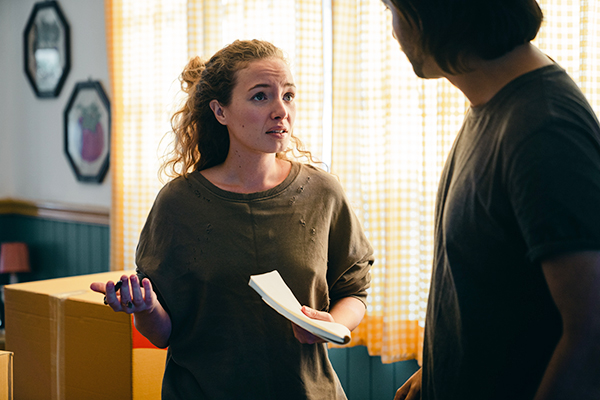How to Stop Parenting you Partner and What to Do Instead
Written by Alysha Jeney, MA, LMFT Owner of Modern love Counseling and Co-Founder of The Modern love Box
How to stop parenting your partner may seem like a challenging process, because you’ve probably tried everything you can think of. You may be on the verge of breaking up, or finding yourself fantasizing about that green grass on the other side. Before making any rash decisions, we would highly suggest taking a moment to reflect. When we find ourselves in this position, it is crucial to do some internal work verses stay stuck in the place of blame. When reading this article, it is important to realize your part, as well as do the work to explore your needs and expression of those needs in order to invoke change in the relationship.
Parenting your partner can feel icky. I know.. icky isn’t the best word to describe feelings, but sometimes icky is the best way to express the resentment, frustration, isolation and fear we can carry when we feel as though we are parenting our partner. It is not uncommon to have a more dominant personality in a relationship that generally makes the bulk of the decisions, but when couples start to feel less of an partnership and more of a parent/child relationship, there are bigger issues that need to addressed under the surface.
 As a therapist, I have heard themes when working with couples. One of the biggest complaints I hear is one person may experience their partner hasn’t changed or matured. Because we ironically find ourselves choosing partners that are exact opposite of us in so many ways, one person can eventually start to feel taken advantage of or resentful of the lack of teamwork they perceive is not being reciprocated in the relationship. That’s because relationships don’t work this way; they are not a love-alive-no-more-quid-pro-quo/article_3e7f7aa1-e3fb-58ab-8642-00cacb66a24f.html” target=”_blank” rel=”noopener”>quid pro quo, (ex: “the more I give, the more I will receive.”) Our relationships are rarely 50/50. Wait, did you hear that? Relationships are rarely 50/50, yet we often demand this because we are told this is how it should be. We all experience the world differently and somewhere in the middle is the balance that we all need to foster and appreciate in our relationships to find a mutual respect and balance.
As a therapist, I have heard themes when working with couples. One of the biggest complaints I hear is one person may experience their partner hasn’t changed or matured. Because we ironically find ourselves choosing partners that are exact opposite of us in so many ways, one person can eventually start to feel taken advantage of or resentful of the lack of teamwork they perceive is not being reciprocated in the relationship. That’s because relationships don’t work this way; they are not a love-alive-no-more-quid-pro-quo/article_3e7f7aa1-e3fb-58ab-8642-00cacb66a24f.html” target=”_blank” rel=”noopener”>quid pro quo, (ex: “the more I give, the more I will receive.”) Our relationships are rarely 50/50. Wait, did you hear that? Relationships are rarely 50/50, yet we often demand this because we are told this is how it should be. We all experience the world differently and somewhere in the middle is the balance that we all need to foster and appreciate in our relationships to find a mutual respect and balance.
The feeling of parenting your partner may have started from the very beginning of your relationship, or it may have been created as time passed and circumstances changed (or stayed “stagnant”). Regardless of when it started, it is important to understand the why it started and really get to the bottom of understanding what you really want to change.
Generally speaking, people with more assertive and “dominant” personalities tend to be leaders in their personal lives; maybe they are bosses, the oldest child, the “parent” in their family dynamic. These traits can be argued are a cause of nature or nurture, and I believe it is both. On one hand, being dominant and assertive, can be a defense mechanism that was created in early childhood to protect themselves, their family and/or circumstances. As an example, maybe their dominance came from being bullied as a kid by their family or peers; maybe their strong control in managing life came from their unfair role of having to parent their unreliable parents or parents struggling with addiction. The combination of natural personality characteristics and their trauma have blended together to make them very self reliant, structured and more particular.
On the contrary, people who tend to go with the flow more easily and are less confrontational maybe have also learned these techniques to protect themselves as well. For example, maybe their innate reaction to let others make decisions for them came from having a parent with a mental illness and they were never allowed to have an opinion anyway; maybe their contentment came from a fear of failure because they were always told they wouldn’t achieve; maybe they were the middle child and/or had siblings that spoke for them. In combination with their natural personality traits, you can see how their trauma has created more timidness, patience and flexibility.
Clearly, both personality traits have pros and cons. Areas of weakness and areas of strength. Together, we need to learn to accept and appreciate each other’s differences and where they came from, instead of judging them as being “controlling” and/or “lazy.” We have to try to see our partner with compassion to find a common space to relate to each other; otherwise our differences that we were once attracted to, ironically become the exact reason many couples decide to split. Whatever the circumstances of our upbringings, our reactions as adults are often misunderstood by the people we love the most.
Our partner has their own complexities and challenges. They have their own strengths that are triggering for us, because it’s often showing us our own defiance of change.
If you find yourself parenting your partner and feeling resentment or isolated, reflect on these questions before making the decision to leave or repeating the same argument:
- Jot down all the reasons you were attracted to your partner in the first place. Are any of these reasons/traits what you feel frustrated by now? If so, what has changed your perspective?
- What are your expectations of your partner? Is it possible that they are unrealistic, too harsh and/or coming from a judgmental place?
- What needs did you have growing up that may be getting triggered in your current life? (Example: You currently argue with your partner about them making more money, but is it possible that you’re feeling insecure or uncertain about the future and want more reliability? Is it possible you are subconsciously speaking in code and argue about content related issues that may have a deeper need or insecurity?)
- Is it possible that you are feeling out of control in your life? If so, have you explained this vulnerably to your partner that you are feeling stuck without blaming them?
- Is it possible that it is challenging for you to ask for help? If so, how could you be unintentionally coming across defensive, controlling and/or demanding because of this?
- Do you have a pattern of trying to fix, control and/or save everyone? Where does this come from?
- Are you feeling appreciated, valued and seen in your relationship? If not, how may this be contributing to your frustration and expectations?
Now, after your reflection, try these tips to initiate more understanding in your partnership in hopes of saving it:
- Talk about childhoods and impactful moments in your lives: From a curious place, discuss how you both perceive the why behind why you are the way that you are. Go further into discussion about your relationship/” target=”_blank” rel=”noopener”>childhoods and how they are impacting your current relationship. How does this give you both more compassion and understanding as to why certain characteristics or behaviors may be hard to change in adulthood.
- Discuss your authentic and vulnerable needs, not disappointments or demands: From a sincere place, discuss your unmet needs in childhood. Your insecurities about how you show up in the relationship. What are you both trying to protect? Why is X, Y, and Z issue really an issue?
- Discuss how your expectations of each other and of change may be limiting and unrealistic: This doesn’t mean that you don’t have needs and requests of your partner, but what this does mean is you both have to own how your projections are affecting each other, as well contributing to your own suffering. Sometimes our expectations and the way we think are the problem. If you originally fell in love with the characteristics of your partner that now upset you, it’s important to recognize why. What about your expectations have changed and is it possible to find a middle ground?
- Identify what areas you both need to work on: Safely take accountability for your setbacks and explain to your partner how you see these challenges showing up in the relationship. With humility, own them. No one wants you to be perfect, but by taking accountability, it can help your partner feel validated, thus creating healing and motivation to want to work on change together.
- Be aware of when your triggers alert you and how you deal with those triggers automatically: Next time you feel annoyed, angry or hurt, stop and reflect on why. Then notice how you tend to deal with your discomfort automatically and instead of reacting out of habit, try stopping, reflecting and gaining insight before you respond.
- Define roles in relationship and discuss ways to share more responsibilities mutually: Collaborate! It seems silly to sit down and structure a list of roles and responsibilities, but it is more effective to address directly than to make assumptions. Together, list all the adulting responsibilities you both have and what things you feel is “your” responsibility and why. Maybe this exercise highlights discrepancies and/or helps the two of you have more conversation about what is important and why. Remember, you can strive for 50/50, but don’t expect it!
- Identify your strengths and weaknesses and how you’d work better as a team if you both were to work with your strengths more: If your relationship was a sports team, what position would each of you flourish in? Together, agree and collaborate on what roles and responsibilities that are within your “expertise,” as well as commit to taking on something within the relationship that challenges your comfort zone.
- Communicate about what you both desire in terms of feeling appreciated in your relationship. Try thelove-language” target=”_blank” rel=”noopener”> five love languages quiz to help you identify ways you feel and experience love.
- Try love-counseling/”>Couples Therapy! 🙂
As you can see, this complicated dynamic is not simple. We often let our egos convince us that our partner is the enemy and we forget that we are just flawed imperfect humans doing the best that we can. Sometimes, when we find ourselves partnering our partner, we don’t realize that we are feeling defeated, lonely and or anxious about the unknown of our own lives. Sometimes, we don’t realize that we are struggling internally and thus it is necessary to build self awareness before blaming our partner for their deficancies. It is important to realize that having needs and requests are important, but we also have to learn to be patient and love our partners unconditionally at the same time. Regardless of you feeling like the parent or child in your relationship, you can hopefully see that you both are feeling misunderstood in the relationship. It’s important to gain perceptive and clear up assumptions that are creating toxicity in your partnership.
Thanks for reading How to Stop Parenting Your Partner! Have you experienced this dynamic before? Tell us about it!



